Description
Introduction
Originally delivered as five morning lectures on Caitanya-caritāmṛta – the authoritative biography of Lord Caitanya Mahāprabhu, by Kṛṣṇadāsa Kavirāja Gosvāmī – before the International Society for Krishna Consciousness, New York City, April 10–14, 1967.
The word caitanya means “living force,” carita means “character,” and amṛta means “immortal.” As living entities we can move, but a table cannot because it does not possess living force. Movement and activity may be considered signs of the living force. Indeed, it may be said that there can be no activity without the living force. Although the living force is present in the material condition, this condition is not amṛta, immortal. The words caitanya-caritāmṛta, then, may be translated as “the character of the living force in immortality.”
But how is this living force displayed immortally? It is not displayed by man or any other creature in this material universe, for none of us are immortal in these bodies. We possess the living force, we perform activities, and we are immortal by our nature and constitution, but the material condition into which we have been put does not allow our immortality to be displayed. It is stated in the Kaṭha Upaniṣad that eternality and the living force are characteristics of both ourselves and God. Although this is true in that both God and ourselves are immortal living beings, there is a difference. As living entities, we perform many activities, but we have a tendency to fall down into material nature. God has no such tendency. Being all-powerful, He never comes under the control of material nature. Indeed, material nature is but one display of His inconceivable energies.
An analogy will help us understand the distinction between ourselves and God. From the ground we may see only clouds in the sky, but if we fly above the clouds we can see the sun shining. From the sky, skyscrapers and cities seem very tiny; similarly, from God’s position this entire material creation is insignificant. The living entity is also insignificant, and his tendency is to come down from the heights, where everything can be seen in perspective. God, however, does not have this tendency. The Supreme Lord is not subject to falling down into illusion (māyā), any more than the sun is subject to falling beneath the clouds. Impersonalist philosophers (Māyāvādīs) maintain that because we fall under the control of māyā when we come into this material world, God must also fall under māyā’s control. This is the fallacy of their philosophy.
Lord Caitanya Mahāprabhu should therefore not be considered one of us. He is Kṛṣṇa Himself, the supreme living entity, and as such He never comes under the cloud of māyā. Kṛṣṇa, His expansions and even His higher devotees never fall into the clutches of illusion. Lord Caitanya came to earth simply to preach kṛṣṇa-bhakti, love of Kṛṣṇa. In other words, He is Lord Kṛṣṇa Himself teaching the living entities the proper way to approach Kṛṣṇa. He is like a teacher who, seeing a student doing poorly, takes up a pencil and writes, saying, “Do it like this: A, B, C.” From this one should not foolishly think that the teacher is learning his ABC’s. Similarly, although Lord Caitanya appears in the guise of a devotee, we should not foolishly think He is an ordinary human being; we should always remember that Lord Caitanya is Kṛṣṇa (God) Himself teaching us how to become Kṛṣṇa conscious, and we must study Him in that light.
In the Bhagavad-gītā (18.66) Lord Kṛṣṇa says, “Give up all your nonsense and surrender to Me. I will protect you.”
We say, “Oh, surrender? But I have so many responsibilities.”
And māyā, illusion, says to us, “Don’t do it, or you’ll be out of my clutches. Just stay in my clutches, and I’ll kick you.”
It is a fact that we are constantly being kicked by māyā, just as the male ass is kicked in the face by the she-ass when he comes for sex. Similarly, cats and dogs are always fighting and whining when they have sex. Even an elephant in the jungle is caught by the use of a trained she-elephant who leads him into a pit. We should learn by observing these tricks of nature.
Māyā has many ways to entrap us, and her strongest shackle is the female. Of course, in actuality we are neither male nor female, for these designations refer only to the outer dress, the body. We are all actually Kṛṣṇa’s servants. But in conditioned life we are shackled by iron chains in the form of beautiful women. Thus every male is bound by sex, and therefore one who wishes to gain liberation from the material clutches must first learn to control the sex urge. Unrestricted sex puts one fully in the clutches of illusion. Lord Caitanya Mahāprabhu officially renounced this illusion at the age of twenty-four, although His wife was sixteen and His mother seventy and He was the only male in the family. Although He was a brāhmaṇa and was not rich, He took sannyāsa, the renounced order of life, and thus extricated Himself from family entanglement.
If we wish to become fully Kṛṣṇa conscious, we have to give up the shackles of māyā. Or, if we remain with māyā, we should live in such a way that we will not be subject to illusion, as did the many householders among Lord Caitanya’s closest devotees. With His followers in the renounced order, however, Lord Caitanya was very strict. He even banished Junior Haridāsa, an important kīrtana leader, for glancing lustfully at a woman. The Lord told him, “You are living with Me in the renounced order, and yet you are looking at a woman with lust.” Other devotees of the Lord had appealed to Him to forgive Haridāsa, but He replied, “All of you can forgive him and live with him. I shall live alone.” On the other hand, when the Lord learned that the wife of one of His householder devotees was pregnant, He asked that the baby be given a certain auspicious name. So while the Lord approved of householders having regulated sex, He was like a thunderbolt with those in the renounced order who tried to cheat by the method known as “drinking water underwater while bathing on a fast day.” In other words, He tolerated no hypocrisy among His followers.
From the Caitanya-caritāmṛta we learn how Lord Caitanya taught people to break the shackles of māyā and become immortal. Thus, as mentioned above, the title may be properly translated as “the character of the living force in immortality.” The supreme living force is the Supreme Personality of Godhead. He is also the supreme entity. There are innumerable living entities, and all of them are individuals. This is very easy to understand: We are all individual in our thoughts and desires, and the Supreme Lord is also an individual person. He is different, though, in that He is the leader, the one whom no one can excel. Among the minute living entities, one being can excel another in one capacity or another. Like each of these living entities, the Lord is an individual, but He is different in that He is the supreme individual. God is also infallible, and thus in the Bhagavad-gītā He is addressed as Acyuta, which means “He who never falls down.” This name is appropriate because in the Bhagavad-gītā Arjuna falls into illusion but Kṛṣṇa does not. Kṛṣṇa Himself reveals His infallibility when he says to Arjuna, “When I appear in this world, I do so by My own internal potency.” (Bhagavad-gītā 4.6)
Thus we should not think that Kṛṣṇa is overpowered by the material potency when He is in the material world. Neither Kṛṣṇa nor His incarnations ever come under the control of material nature. They are totally free. Indeed, in Śrīmad-Bhāgavatam one who has a godly nature is actually defined as one who is not affected by the modes of material nature although in material nature. If even a devotee can attain this freedom, then what to speak of the Supreme Lord?
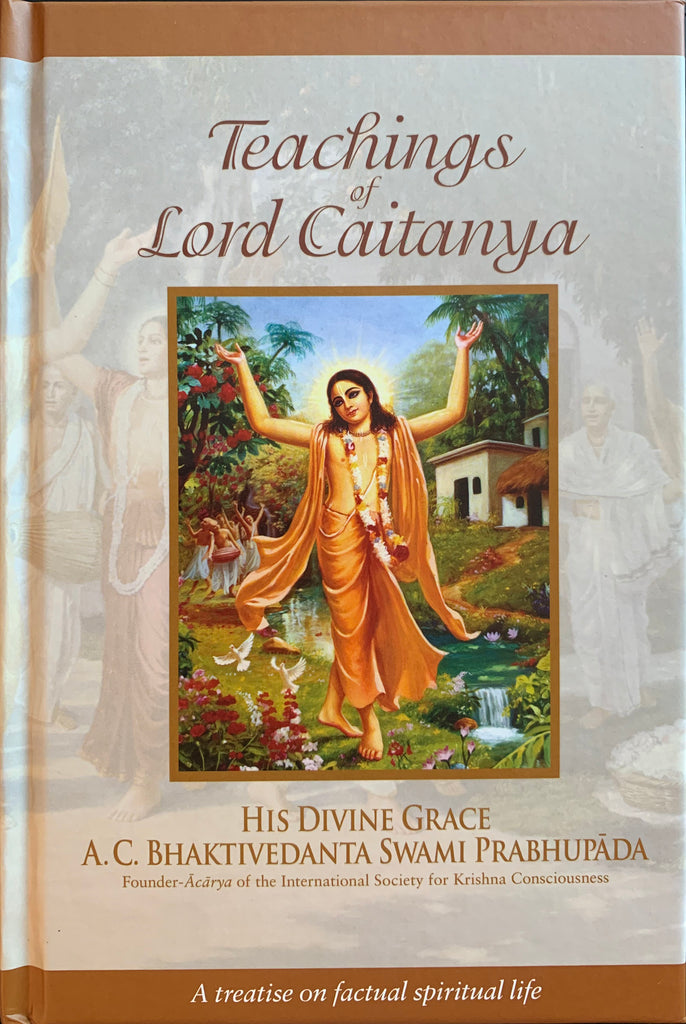
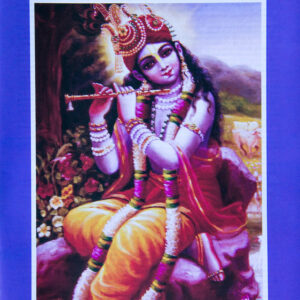

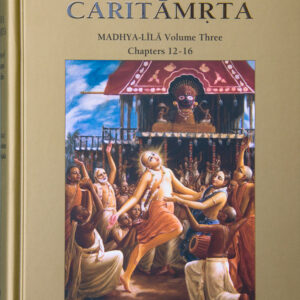

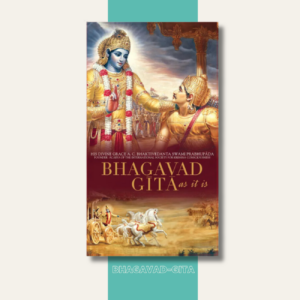
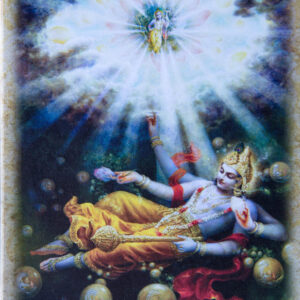
Reviews
There are no reviews yet.